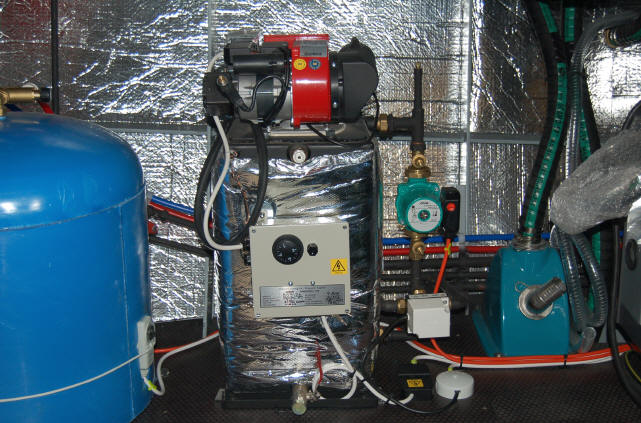|
Boating Technical Issues - Boat Central Heating Systems
Central heating in boats is a very wide ranging subject and the choice of
heating type will depend on a number of factors such as whether you are
resident, the installation and running costs, convenience and available space.
The choice of fuel for boat CH boilers is usually either gas or liquid fuel. For
KATHE II we chose a diesel fired boiler as we hoped to replicate the convenience
of our house CH but experience with the Alde boiler on our narrowboat taught us
that it would be too expensive to use bottled gas for heating the barge. However
the Alde was a very convenient and clean system that provided us with all the
hot water and heating that we required over the eight years that we had the
narrowboat.
The choice of diesel heating systems is quite wide ranging from the Eberspacher
hot air system to the Webasto, Kabola and Harworth Heating oil fired boilers and
no doubt many others. We chose the Harworth Heating PJ diesel fired boiler
giving an output of 12kW (smaller than a domestic boiler) that is controlled by
a conventional domestic style controller and it uses oil firing equipment that
is normally used on domestic oil fired boilers so that servicing or repairs can
be undertaken by non-specialist boiler service technicians. This boiler comes
with or without a casing depending upon whether it is going to be visible or
located in a boiler/engine room as the attached photo shows where ours is.
 This boiler and its fan is
not the quietest of units but it is not too intrusive even in the early hours of
the morning when it comes on. This boiler and its fan is
not the quietest of units but it is not too intrusive even in the early hours of
the morning when it comes on.
What is our experience with this unit? Over this last extremely cold winter the
boiler has been in timed service (twice/day) supplying hot water and heating a
combination of eight radiators and heated towel rails. To date the boiler has
been absolutely reliable and the manufacturers claim that it will consume around
42litres of oil per week - my own experience confirms that this is about right
for the timed usage that we have. The efficiency of this boiler can be judged by
the fact that you can place your hand very close to the boiler exhaust outlet as
the exhaust temperature is quite low indicating that the boiler is transferring
the maximum amount of heat from the furnace to the water jacket. When I come to
service the boiler during the Spring I shall be looking closely to see if this
low exhaust gas temperature has resulted in the formation of dewpoint acidic
compounds that could lead to corrosion within the furnace chamber and exhaust.
In the meanwhile we shall enjoy the comfort that the boiler provides and based
upon our own experience to date I would suggest that anyone requiring such a
boiler should seriously consider this equipment.
Return
to Pipeline Index |



